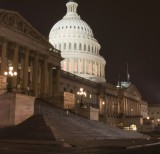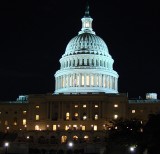
Open, Accountable Government

Top 400 Taxpayers See Tax Rates Rise, But There’s More to the Story
As Americans were gathering party supplies to greet the New Year, the Internal Revenue Service released their annual report of cumulative tax data reported on the 400 tax r...
read in full
Chlorine Bleach Plants Needlessly Endanger 63 Million Americans
Chlorine bleach plants across the U.S. put millions of Americans in danger of a chlorine gas release, a substance so toxic it has been used as a chemical weapon. Greenpeace’s new repo...
read in full
U.S. Industrial Facilities Reported Fewer Toxic Releases in 2014
The Toxics Release Inventory (TRI) data for 2014 is now available. The good news: total toxic releases by reporting facilities decreased by nearly six percent from 2013 levels. Howe...
read in full
Methane Causes Climate Change. Here's How the President Plans to Cut Emissions by 40-45 Percent.
UPDATE (Jan. 22, 2016): Today, the Bureau of Land Management (BLM) released its proposed rule to reduce methane emissions...
read in full
Living in the Shadow of Danger: Poverty, Race, and Unequal Chemical Facility Hazards
People of color and people living in poverty, especially poor children of color, are significantly more likely...
read in full
A Tale of Two Retirements: One for CEOs and One for the Rest of Us
The 100 largest CEO retirement funds are worth a combined $4.9 billion, equal to the entire retirement account savings of 41 percent of American fam...
read in full
Gasping for Support: Implementation of Tougher Air Quality Standards Will Require New Funds for State Agencies
New scientific research shows that the current levels of...
read in full








 Though the Clean Air Act and rules from the U.S. Environmental Protection Agency (EPA) have reduced national air pollution levels, hundreds of communities around the country still struggle with dangerously poor air quality. Released on Nov. 7,
Though the Clean Air Act and rules from the U.S. Environmental Protection Agency (EPA) have reduced national air pollution levels, hundreds of communities around the country still struggle with dangerously poor air quality. Released on Nov. 7,  Even though the Super Committee is stealing the limelight, this summer's debt ceiling deal didn't just create the deficit-cutting committee. It also forces both the House and the Senate to vote on a balanced budget amendment to the Constitution.
Even though the Super Committee is stealing the limelight, this summer's debt ceiling deal didn't just create the deficit-cutting committee. It also forces both the House and the Senate to vote on a balanced budget amendment to the Constitution.  Several recently published studies compare the policy and practice of transparency in the United States and other countries. Such studies provide useful measures of U.S. openness relative to real-world conditions, in addition to highlighting global best practices and alternative approaches. The U.S. ranked in the middle range in the studies, demonstrating how other countries have met the challenges of 21st-century transparency while the U.S. has lagged in some areas.
Several recently published studies compare the policy and practice of transparency in the United States and other countries. Such studies provide useful measures of U.S. openness relative to real-world conditions, in addition to highlighting global best practices and alternative approaches. The U.S. ranked in the middle range in the studies, demonstrating how other countries have met the challenges of 21st-century transparency while the U.S. has lagged in some areas.



